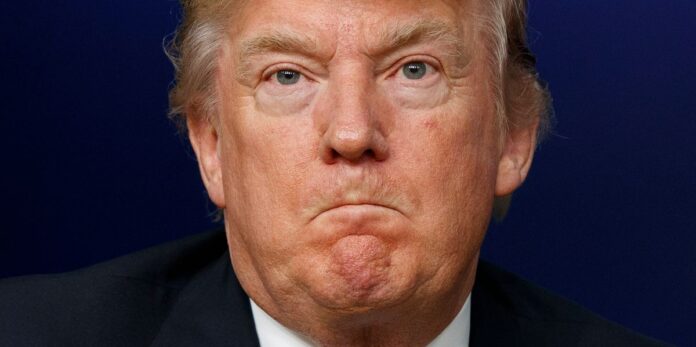“Trump’s Controversial Support for Vaccine Conspiracy Theory”
In a recent social media post, former President Donald Trump appeared to support a conspiracy theory about COVID-19 vaccines, further fueling misinformation and raising concerns about public health messaging. The post, shared on Instagram by Robert F. Kennedy Jr., a prominent anti-vaccine activist, showcased a statement by Trump that suggested he is sympathetic to the debunked theory linking vaccines to autism.
The statement in question, as shared by Kennedy, reads: “You take a vaccine, and all of a sudden you can’t see, or your child is autistic.” Trump’s apparent support for this unfounded claim comes as the world continues to battle the COVID-19 pandemic and strives to promote vaccine uptake to achieve herd immunity.
This latest development adds to a long history of false or misleading statements made by Trump, especially regarding public health issues. In the past year alone, Trump has made numerous notable false claims, including falsely asserting that the 2020 presidential election was stolen from him, despite no evidence of widespread voter fraud. According to fact-checkers, Trump has made over 30,000 false or misleading statements during his time in office, with an average of 12 false claims per day in his last year as president.
Political analysts and fact-checkers have consistently called into question Trump’s relationship with the truth. According to a report by The Washington Post, Trump’s repeated dissemination of falsehoods has eroded public trust and led to a significant erosion of confidence in institutions. This erosion of trust has had real-world consequences, from a decline in public discourse to incidents of unrest and violence linked to false narratives perpetuated by the former president.
Furthermore, Trump’s spreading of misinformation has sparked controversies and legal issues, as seen in the aftermath of the 2020 election. His false claims of election fraud have led to numerous legal challenges and unprecedented efforts to overturn the election results, culminating in the deadly insurrection at the U.S. Capitol on January 6, 2021.
As the public continues to grapple with the impact of misinformation, it is imperative to fact-check and critically examine statements made by public figures. The spread of falsehoods, particularly on critical issues like public health and election integrity, has far-reaching implications for society. Maintaining an objective approach to reporting and holding influential figures accountable for their statements is crucial in upholding the integrity of public discourse and institutions.
In conclusion, the apparent support for a vaccine conspiracy theory by Donald Trump highlights the ongoing challenge of combating misinformation and its potential impact on public health and democratic processes. It underscores the importance of critically evaluating statements made by public figures and the need to uphold factual accuracy in public discourse. As society continues to navigate the consequences of falsehoods, it is crucial to prioritize truth and evidence-based information to safeguard public well-being and democratic principles.
Source link
Redirect URL
